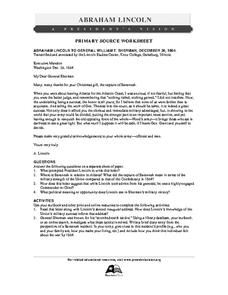Humanities Texas
Primary Source Worksheet: Clark Clifford, Letter to Lyndon B. Johnson
Vietnam War did indeed turn into a quagmire. Students of history will gain much from a close reading of this 1965 prophetic letter from the Secretary of Defense, Clark Clifford to President Lyndon B. Johnson, advising the president to...
Humanities Texas
Primary Source Worksheet: Delaware Memorial Expressing Opposition to the Embargo Act of 1807
The right to petition is clearly illustrated by this primary source document that presents arguments against Thomas Jefferson's Embargo Act of 1807.
Humanities Texas
Primary Source Worksheet: Theodore Roosevelt, Excerpt from Eighth Annual Message to Congress
As Theodore Roosevelt reminded Congress in 1908, corporation one is not corporation two. Readers of this excerpt from Roosevelt's Message to Congress have an opportunity to sharpen their comprehension skills as they study this primary...
Humanities Texas
Primary Source Worksheet: Theodore Roosevelt, Excerpt from Inaugural Address
"Much has been given us, and much will rightfully be expected from us." As part of a series of worksheets that provide readers with an opportunity to develop their primary source comprehension skills, kids examine an excerpt from...
Humanities Texas
Primary Source Worksheet: Thomas Jefferson, Message to Congress Concerning Louisiana
Proficient reading of informational text, especially primary source documents, requires practice. This message from Thomas Jefferson about the Louisiana Purchase offers readers a chance to develop these comprehension skills.
Humanities Texas
Primary Source Worksheet: Thomas Jefferson, Confidential Message to Congress Concerning Western Exploration and Relations with the Indians
A confidential message written by Thomas Jefferson provides readers with an opportunity to practice their reading comprehension skills. The resource, part of a series, includes questions that require a close reading of the message and a...
Humanities Texas
Primary Source Worksheet: Excerpt from Reagan's Farewell Address
Here's a worksheet designed to help learners develop their skill reading primary source documents. The questions, based on an excerpt from Ronald Reagan's Farewell Address, encourages close reading and analysis.
Humanities Texas
Primary Source Worksheet: Excerpt from Reagan's Speech to the National Association of Evangelicals
Ronald Reagan's 1983 speech to the National Association of Evangelicals (also know as the "Evil Empire Speech") offers readers with an opportunity to practice their skills at reading informational text, specifically primary source...
Humanities Texas
Primary Source Worksheet: Ronald Reagan, Excerpt from Reagan's First Inaugural Address
A key challenge in teaching kids how to read informational text, particularly primary source documents, is finding suitable resources and then developing questions that guide readers. Never fear, help is here in the form of a series of...
Humanities Texas
Primary Source Worksheet: Excerpt from Reagan's Speech "A Time for Choosing"
An excerpt from Ronald Reagan's October 27, 1964 speech in support of presidential nominee Barry Goldwater, "A Time for Choosing," is the text for primary source analysis activity. After reading the document, learners respond to seven...
Humanities Texas
Primary Source Worksheet: Frederick Douglass, “Expression of Gratitude for Freedom”
Here is a fantastic primary source analysis activity regarding Frederick Douglass' speech delivered at the unveiling of the Freedmen's Monument in 1876. The follow-up discussion questions and activities highlight Douglass' discussion of...
Humanities Texas
Primary Source Worksheet: Excerpt from the Diary of Union Soldier Samuel Cormany
Young historians read and analyze a soldier's direct account of his participation in the battle of Gettysburg, as well as consider the overall strategy and tactics taken by the Union and Confederate troops.
Humanities Texas
Primary Source Worksheet: “Report on Manufacturers,” Annals of Congress
Invite your learners to take a look at life during the term of United States president George Washington through analysis of an interesting primary source. The document summarizes American manufacturing capacities, as detailed by the...
Humanities Texas
Primary Source Worksheet: Letter Regarding the Whiskey Rebellion
Analyze the federal government's direct response to the Whiskey Rebellion through this fantastic primary source analysis activity worksheet.
Humanities Texas
Primary Source Worksheet: Abraham Lincoln, Second Inaugural Address
Your young historians will be intrigued to read and analyze Abraham Lincoln's second inaugural address, which discusses the president's take on the causes of the Civil War and connections between the North and the South.
Humanities Texas
Primary Source Worksheet: General Washington, Letter Declaring Acceptance of the Command of the Armies of the United States
Discover what influenced president George Washington's decision in his early career to command the United States army by analyzing his formal acceptance with this primary source analysis worksheet.
Humanities Texas
Primary Source Worksheet: Abraham Lincoln, Letter to General William T. Sherman
A brief letter can speak volumes. Your young historians will analyze a letter written by Abraham Lincoln to General Sherman, and discover the significance of the capture of Savannah, as well as gain insight into Lincoln's role as...
Humanities Texas
Primary Source Worksheet: Abraham Lincoln, Letter to Horace Greeley
Through close analysis of a primary source document and discussion questions, learners gain great insight into how Abraham Lincoln viewed his duties as president of the United States, as well as his response to those who criticized...
Humanities Texas
Primary Source Worksheet: George Washington, Farewell Address
Invite your young historians to consider how the first president of the United States envisioned the future of the new nation with this primary source analysis worksheet on George Washington's Farewell Address.
Humanities Texas
Primary Source Worksheet: Letter from George Washington to the Cabinet
Analyze the significance of George Washington's letter to his cabinet in which he sets forth a tradition of neutrality in wartime for the United States.





















